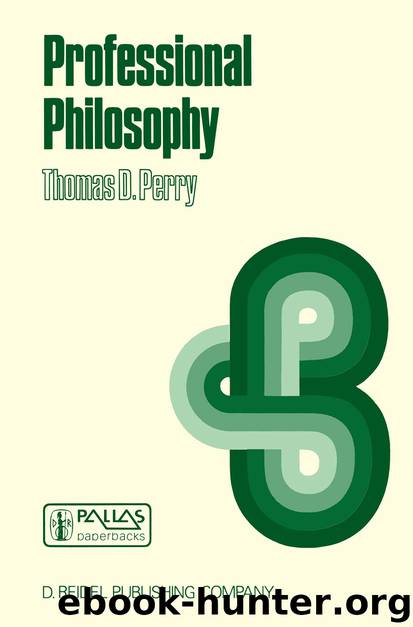Professional Philosophy by Thomas D. Perry

Author:Thomas D. Perry
Language: eng
Format: epub
Publisher: Springer-Verlag Wien 2012
Published: 2014-08-04T16:00:00+00:00
25. CANONICAL LANGUAGE
Quine seems to have at least four objectives in mind when he speaks of “regimenting” language to make it conform to the syntax of mathematical logic, and of then subjecting it to further austerities in the form of “canonical notation.” One purpose is to aid in the clarification and improvement of logical theory itself. Certain formal expressions are convenient for casting ordinary sentences into explicit logical form and deductively operating on them, but theoretically suspect because of their abstractness or complexity. Suppose we find a way to replace them with longer and more cumbersome expressions which are transparently correct in elementary theory. Then we can use the latter expressions when simplified theory is our concern, and we can go on using the shorter and more easily manipulated expressions for ordinary deductive purposes. A second objective is to provide special devices of clarification, disambiguation, and intellectual economy which can be used piecemeal according to the special needs of particular scientific inquiries. Still another purpose is to provide a concise and perspicuous language for the formulation of the fundamental laws of a given branch of science. Statements of the laws of nature are (when true) permanent general truths which admit of formulation in what Quine calls “eternal sentences”: sentences whose truth or falsity does not depend on the circumstances of utterance: the when, where, how, why, or by whom. Now it may be that various idioms of scientific parlance which are logically suspect or “ontologically prodigal” (i.e., which sin against Occam’s Razor) can be eliminated in formulating such sentences. The result would be a sparer and more precise view of the structures of reality which the branch of science in question has so far managed to depict. Finally, there is the “metaphysical” purpose of discovering the best or truest depiction of reality in general. Each elimination of obscure constructions or notions that we manage to achieve, by paraphrase into more lucid elements, is a clarification of the conceptual scheme of science. The same motives that impel scientists to seek ever simpler and clearer theories adequate to the subject matter of their special sciences are motives for simplification and clarification of the broader framework shared by all the sciences. The quest for a simplest, clearest overall pattern of canonical notation is not to be distinguished from a quest of ultimate categories, a limning of the most general traits of reality.
Download
This site does not store any files on its server. We only index and link to content provided by other sites. Please contact the content providers to delete copyright contents if any and email us, we'll remove relevant links or contents immediately.
Bullshit Jobs by David Graeber(4190)
Radical Candor by Kim Scott(2723)
I Am Right, You Are Wrong by Edward De Bono(2441)
23:27 by H. L. Roberts(2250)
Nomadland by Jessica Bruder(2063)
Average Is Over by Tyler Cowen(1848)
The Conflict Resolution Phrase Book by Barbara Mitchell & Cornelia Gamlem(1779)
Out of Our Minds: Learning to Be Creative by Ken Robinson(1745)
High-Impact Interview Questions by Victoria A. Hoevemeyer(1691)
Who Moved My Cheese?: An Amazing Way to Deal With Change in Your Work and in Your Life by Johnson Spencer(1648)
An Everyone Culture: Becoming a Deliberately Developmental Organization by Robert Kegan & Lisa Laskow Lahey(1644)
The Ideal Team Player by Patrick M. Lencioni(1642)
The Asshole Survival Guide by Robert I. Sutton(1598)
Automatic Society by Bernard Stiegler(1556)
Unleashed by Anne Morriss & Frances Frei(1540)
Who by Street Randy & Smart Geoff(1506)
42 Rules of Employee Engagement by Susan Stamm(1477)
96 Great Interview Questions to Ask Before You Hire by Paul Falcone(1452)
Fish! by Stephen C. Lundin(1405)
